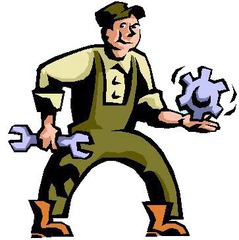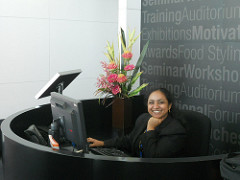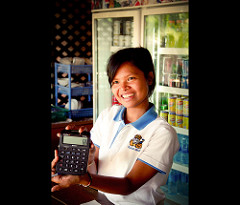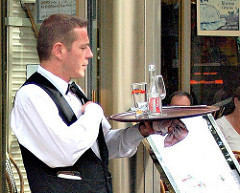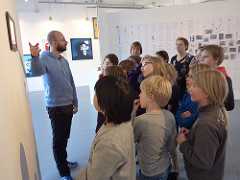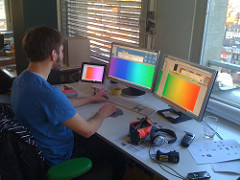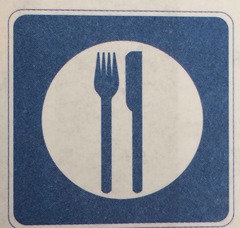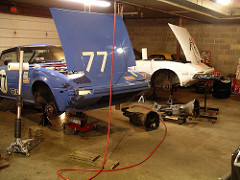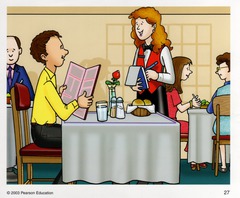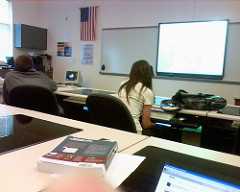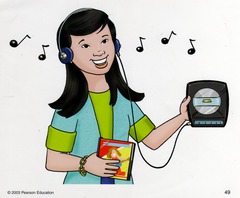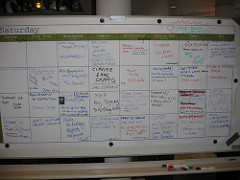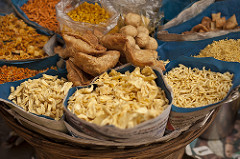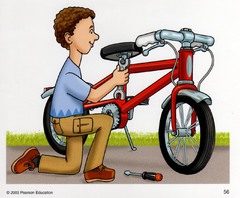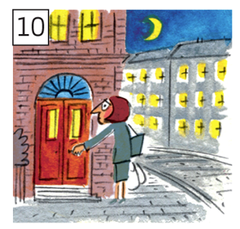Jobs/Professions (Empleo / Profesiones)
What someone does to make money. These terms include all professions and trades.
accountant (contador)
someone who keeps or examines the records of money received, paid, and owed by a company or person.
caregiver (cuidador)
someone who takes care of a person who is young, old, or sick.
carpenter (carpintero)
a person whose job is making and repairing wooden objects and structures.
cashier (cajero)
a person whose job is to receive and pay out money in a shop, bank, restaurant, etc.
chef (cocinero)
a skilled and trained cook who works in a hotel or restaurant, especially the most important cook.
dancer (bailarín)
someone who dances either as a job or for pleasure.
director (director)
a manager of an organization, company, college, etc.
dishwasher (Lavavajillas)
a person who washes dishes.
fitness instructor (instructor de fitness)
someone whose job is to help other people improve fitness.
flight attendant (auxiliar de vuelo)
someone who serves passengers on an aircraft.
mechanic (mecánico)
someone whose job is repairing the engines of vehicles and other machines.
musician (músico)
omeone who is skilled in playing music, usually as a job.
nurse (enfermera)
a person whose job is to care for people who are ill or injured, especially in a hospital.
pilot (piloto)
a person who flies an aircraft.
receptionist (recepcionista)
a person who works in a place such as a hotel, office, or hospital, who welcomes and helps visitors and answers the phone.
reporter (reportero)
a person whose job is to discover information about news events and describe them for a newspaper or magazine or for radio or television.
salesperson (vendedor)
a person whose job is selling things in a shop or directly to customers.
server (servidor)
a central computer from which other computers get information:
singer (cantante)
a person who sings.
team assistant(asistente equipo)
tour guide (Guía turística)
a person employed to show tourists around places of interest.
tutor (tutor)
a teacher who teaches a child outside of school, especially in order to give the child extra help with a subject they find difficult.
usher (ujier)
to show someone where they should go, or to make someone go where you want them to go.
website designer (diseñador web)
person who prepares content for the Web.
entertainment business (negocio del entretenimiento)
shows, films, television, or other performances or activities that entertain people, or a performance of this type.
food service (servicio de comida)
the business of preparing food for schools, hospitals, companies, etc. and serving it to people there.
office work (trabajo de oficina)
normally carried out in an office, for example clerical or administrative work for an organization.
travel industry (Industria de viajes)
an agency that arranges and negotiates flights, holidays, etc., for travellers.
Workplaces (Lugares De Trabajo)
a building or room where people perform their jobs, or these places generally.
airline (linea aerea)
a business that operates regular services for carrying passengers and/or goods by aircraft.
(computer/construction) (Ordenador / construcción)
company (empresa)
an organization that sells goods or services in order to make money.
garage (garaje)
a building where a car is kept, built next to or as part of a house.
hospital (hospital)
a place where people who are ill or injured are treated and taken care of by doctors and nurses.
newspaper (papel periodico)
a regularly printed document consisting of large sheets of paper that are folded together, or a website, containing news reports, articles, photographs, and advertisements.
office (oficina)
a room or part of a building in which people work, especially sitting at tables with computers, phones, etc., usually as a part of a business or other organization.
restaurant (restaurante)
a place where meals are prepared and served to customers.
school (escuela)
a place where children go to be educated.
(department/clothing) store (Departamento / ropa)tienda)
a store having separate sections for a wide variety of goods.
university (universidad)
an educational institution designed for instruction, examination, or both, of students in many branches of advanced learning, conferring degrees in various faculties.
allowance (pensión)
money that you are given regularly, especially to pay for a particular thing.
breakfast (desayuno)
a meal eaten in the morning as the first meal of the day.
clothes (ropa)
things such as dresses and trousers that you wear to cover, protect, or decorate your body.
country (el campo)
the land and scenery of a rural area.
dinner (cena)
the main taken either around midday or in the evening.
drink (bebida)
liquid that is taken into the body through the mouth.
experience (experiencia)
knowledge or skill from doing, seeing, or feeling things.
fashion design (diseño de moda)
an establishment engaged in couture and the proprietor of or designer for such an establishment.
food (comida)
any nutritious substance that people or animals eat or drink, or that plants absorb, in order to maintain life and growth.
heaven (cielo)
is a vault in which the sun, moon, stars, and planets are situated.
house (casa)
a building that people, usually one family, live in.
job (trabajo)
the regular work that a person does to earn money.
music (música)
a pattern of sounds that is made by playing instruments or singing, or a recording of this
passenger (pasajero)
someone who is travelling in a car, plane, etc., but not controlling it.
patient (paciente)
able to stay calm and not get upset, especially when something takes a long time.
phone (teléfono)
a piece of equipment that is used to talk to someone who is in another place.
schedule (horario)
a list of the times and days of classes at a school, college, university, etc.
snack (bocadillo)
a small amount of food.
thing (cosa)
used to mean an object without saying its name.
time (tiempo)
a period of minutes, hours, years, etc.
work (trabajo)
to do a job that you get money for
trabajar.
bad (malo)
of low quality and not acceptable.
better (mejor)
of a higher quality or more enjoyable than someone or something else.
busy (ocupado)
working hard, or giving your attention to a particular activity.
different (diferente)
not the same as someone or something else.
.
difficult (difícil)
not easy to do or understand.
expensive (caro)
costing a lot of money.
fantastic (fantástico)
extraordinarily good or attractive.
fast (rápido)
moving or capable of moving at high speed.
favorite (favorito)
a person or thing that is especially popular or particularly well liked by someone.
full-time (tiempo completo)
happening or working for the whole of the working week and not only part of it.
great (gran)
Apocope of great used in front of masculine and feminine names in singular.
part-time (tiempo parcial)
working or studying only for part of the day or the week.
similar (similar)
Something that has things similar to others, although not exactly the same.
worse (peor)
more unpleasant, difficult, etc.
answer (respuesta)
to speak or write back to someone who has asked you a question.
build (construir)
to make something by putting materials and parts together.
care for (cuidar a)
to feel interested in something or worried about it.
cook (cocinar)
to make food ready to eat.
do (hacer)
used with another verb to form questions and negative phrases.
earn (ganar)
to get money for doing work.
fix (arreglar)
to repair something.
have a job/lunch (tener trabajo / almorzar)
Perform a trade in any company or workplace.
meal eaten in the middle of the day, typically one that is lighter or less formal than an evening meal.
know (saber)
o have information about something in your mind.
live (vivir)
to have your home somewhere.
own (propio)
belonging to a particular person.
save (guardar)
to keep something to use in the future.
sell (vender)
to give something to someone who gives you money for it.
sleep (sueño)
the state you are in when you are sleeping, or a period of time when you are sleeping.
Start (comienzo)
the beginning of something.
stay up (Permanecer de pié)
to continue to be in a particular state.
study (estudio)
to learn about a subject, usually at school or university.
take care of (cuidar de)
keep (someone or something) safe and provided for.
teach (enseñar)
to give classes in a particular subject at a school, university, etc.
wake up (despertarse)
to stop sleeping or to make someone else stop sleeping.
watch (ver)
to look at something for a period of time.











